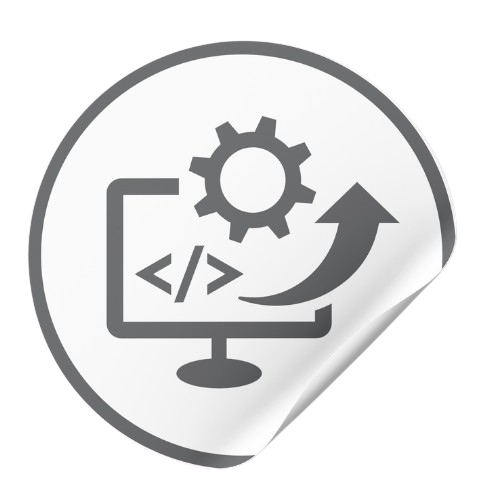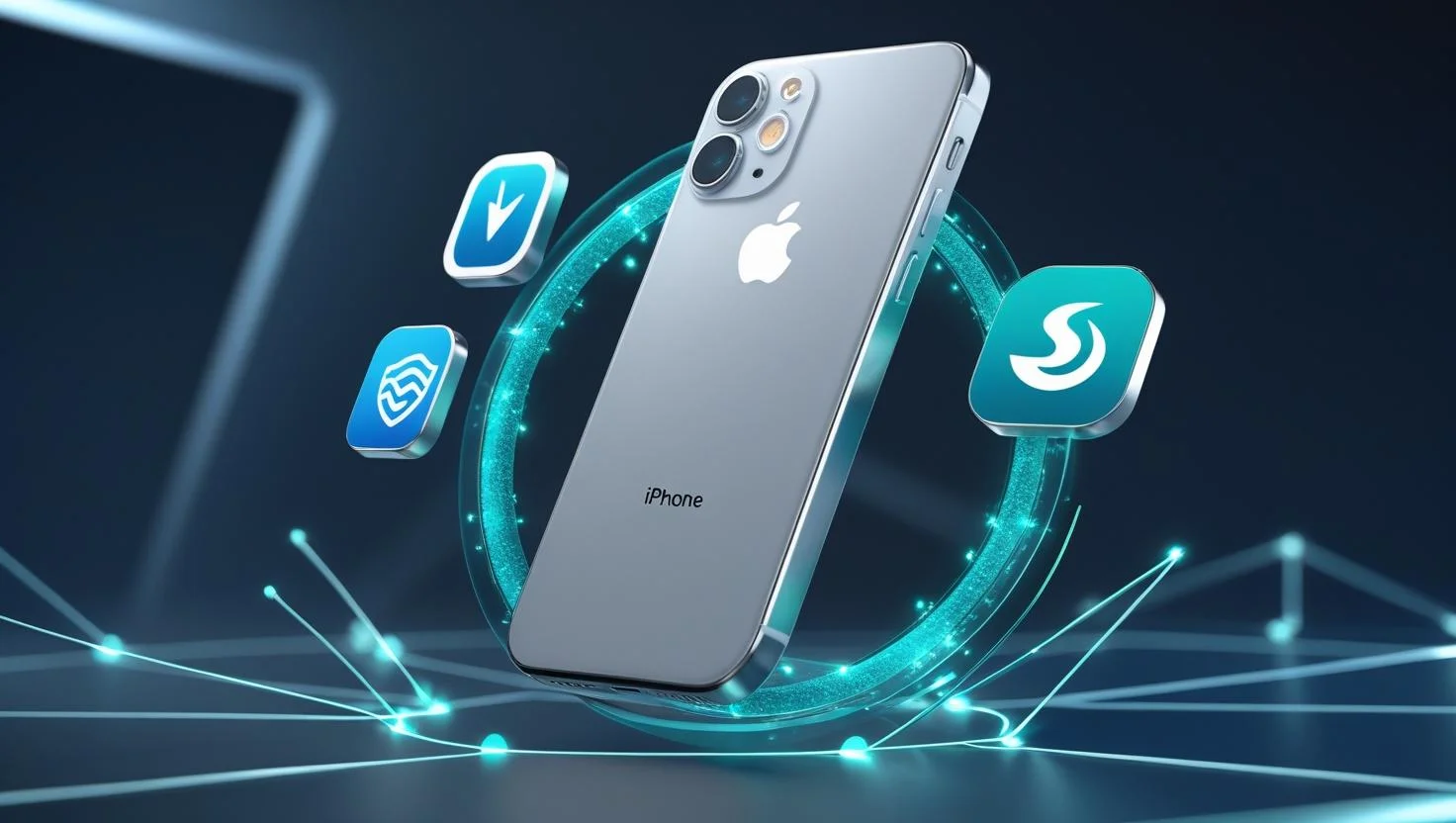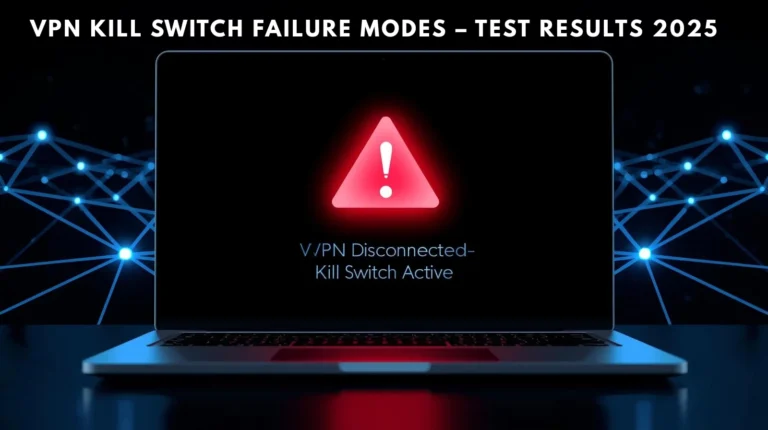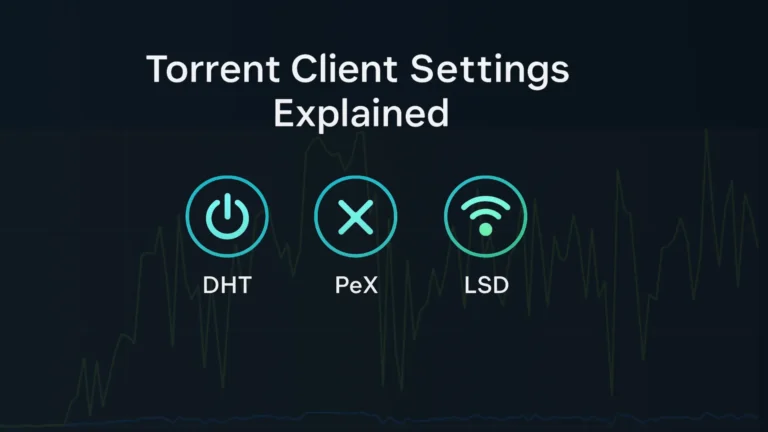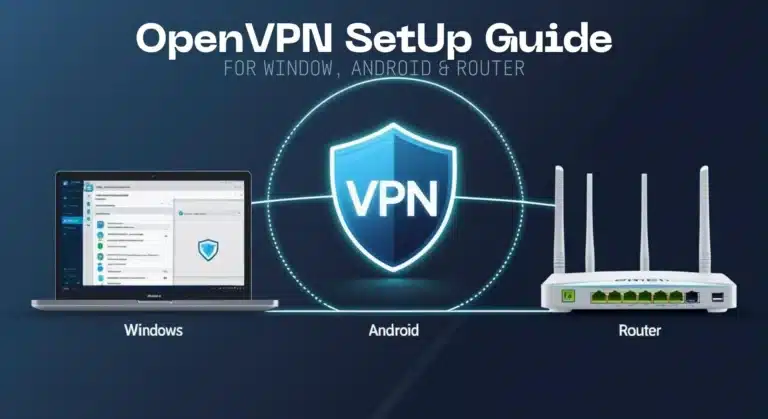Looking for the best VPN for iPhone in 2025? We’ve got you covered. After extensive testing, our top pick is NordVPN – it’s the fastest, most secure, and overall best VPN app for iPhone this year. Other highly-rated options include Surfshark, ExpressVPN, ProtonVPN, and AtlasVPN (which offered a great free plan but has since merged into NordVPN).
Each of these VPN for iOS apps will encrypt your iPhone’s internet traffic, hide your IP address, and protect your privacy on the go. In this comprehensive guide, we’ll explain why you need a VPN on your iPhone in 2025, compare the top 5 iPhone VPNs (with a handy comparison table), provide in-depth reviews with real pros/cons, show you how to install and use a VPN on iPhone step-by-step, and answer FAQs. By the end, you’ll be able to secure your iPhone for private browsing, safe streaming on public Wi-Fi, and unrestricted internet access. Let’s dive in!
Why Do You Need a VPN on Your iPhone in 2025?
iPhones are known for strong security, but even in 2025 your online activity isn’t automatically private. Whenever you browse or use apps on your iPhone, your internet service provider and others can potentially see your activity. This is especially risky on public Wi-Fi networks (like at cafes or airports), where hackers could intercept your data. A VPN (Virtual Private Network) fixes this by creating an encrypted tunnel for all your internet traffic, so outsiders can’t snoop on your browsing, messaging, or any data you send. In short, a VPN keeps your iPhone’s internet connection private and secure even on untrusted networks.
Privacy concerns for mobile users are higher than ever. Many iOS apps and websites track personal data and share it with third parties (over 70% of apps share your info with advertisers). Your iPhone’s built-in security (like app sandboxing and Apple’s App Tracking Transparency) helps, but it doesn’t hide your IP address or encrypt all traffic. That’s where a VPN comes in: it masks your IP with one from the VPN server and encrypts everything you do online. This prevents trackers, ISPs, or even governments from easily profiling your activity. In regions with censorship, a VPN can also let you access the open internet freely.
Another big reason to use a VPN on iPhone is streaming and geo-unblocking. A VPN lets you access content that’s blocked or limited to certain countries. For example, you can watch your U.S. Netflix, Disney+ or HBO Max library while traveling abroad by connecting through a VPN server back home. Similarly, you can unlock foreign streaming services (like BBC iPlayer or regional sports) by choosing an appropriate server location. Without a VPN, these services detect your IP location and might block or show limited content. With a VPN, your iPhone can virtually “relocate” so you stream as if you were in another country, all while keeping the connection secure and encrypted.
It’s worth noting that Apple introduced iCloud Private Relay for Safari, but it’s not a full VPN – it only works in the Safari browser and doesn’t let you choose server locations (so it’s not useful for streaming). To fully secure all apps (mail, social media, banking, etc.) and have the benefits of location switching, a dedicated VPN app is a must.
In summary, using a VPN on your iPhone in 2025 is essential for:
- Privacy: Encrypting your data so no one can spy on your online activities, especially on public Wi-Fi
- Security: Protecting sensitive info (passwords, banking details) from hackers and snoops.
- Access: Unblocking streaming services and websites by bypassing geo-restrictions.
- Anonymity: Hiding your real IP address and location for a more private browsing experience.
With that covered, let’s compare the top iPhone VPN apps of 2025 and see which one fits your needs best.
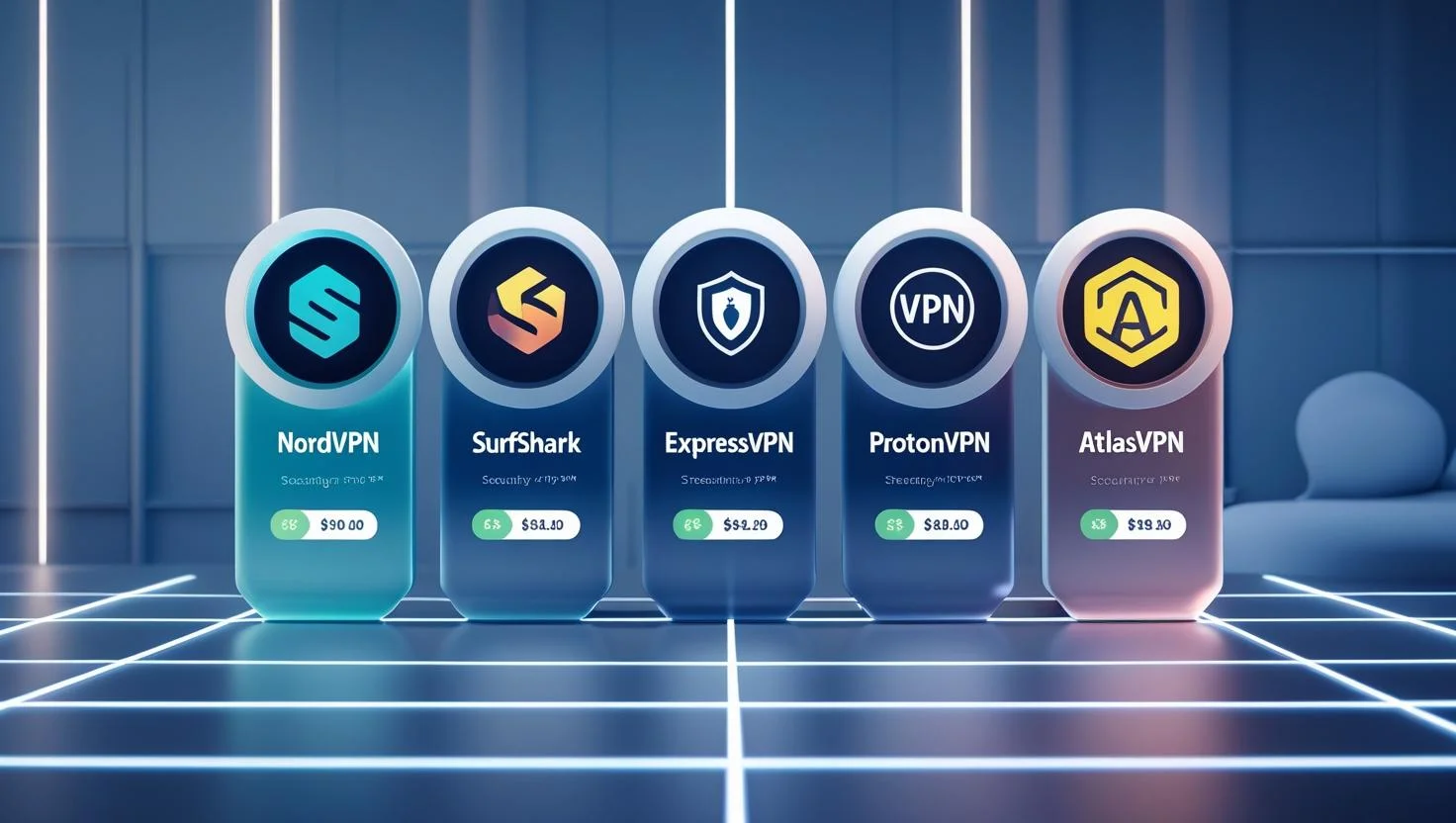
Best VPNs for iPhone & iOS – Comparison Table
To help you choose, here’s a quick comparison of the top 5 VPNs for iPhone. We’ve highlighted their free plan availability, speed, logging policy, streaming support, App Store ratings, pricing, and a handy link to get started:
| VPN Service | Free Plan | Speed | Logging Policy | Streaming Support | iOS App Rating | Pricing (Best Deal) |
|---|---|---|---|---|---|---|
| NordVPN – Top Pick | No (7-day trial) | Excellent – Very fast (NordLynx protocol) | No-Logs, audited (Panama HQ) | Yes – Netflix, Hulu, BBC iPlayer & more | 4.7★ (out of 5) | From ~$3.29/mo (2-year plan) |
| Surfshark – Best Value | No (7-day trial) | Excellent – 10 Gbps servers, great speeds | No-Logs, audited (Netherlands) | Yes – Netflix, Amazon, etc. (unlimited devices) | 4.8★ (out of 5) | From ~$2.00/mo (2-year + bonus) |
| ExpressVPN – Premium | No (7-day trial) | Excellent – Lightway protocol, very fast | No-Logs, audited (BVI jurisdiction) | Yes – 200+ streaming services | 4.7★ (out of 5) | From ~$6.67/mo (12+3 mo plan) |
| ProtonVPN – Free Option | Yes – (unlimited free) | Very Good – 10 Gbps on premium servers | No-Logs, open-source (Swiss-based) | Yes – (Plus plan needed for streaming) | 4.6★ (out of 5) | Free, Premium from ~$4/mo |
| AtlasVPN – Budget | Yes – (limited free) | Good – decent speeds (IKEv2 protocol) | No-Logs (US-based; service ended 2024) | Yes – (basic Netflix, iPlayer support) | 4.8★ (at shutdown) | Free, Premium ~$1.99/mo (3-year) |
Table Notes: App ratings are from the Apple App Store user reviews. Pricing is the lowest effective monthly price for long-term plans (excluding temporary promos).
AtlasVPN users: AtlasVPN discontinued service in April 2024 and existing users were migrated to NordVPN. We include it here for transparency, but new users should consider the other listed VPNs (or NordVPN’s plans, which now encompass AtlasVPN’s offerings).
Next, we’ll dive deeper into each of these VPNs with in-depth reviews, including real pros and cons, iOS App Store ratings, free trial info, and pricing details for each provider.
In-Depth Reviews of the Top 5 VPNs for iPhone
1. NordVPN – Best Overall VPN for iPhone & iOS
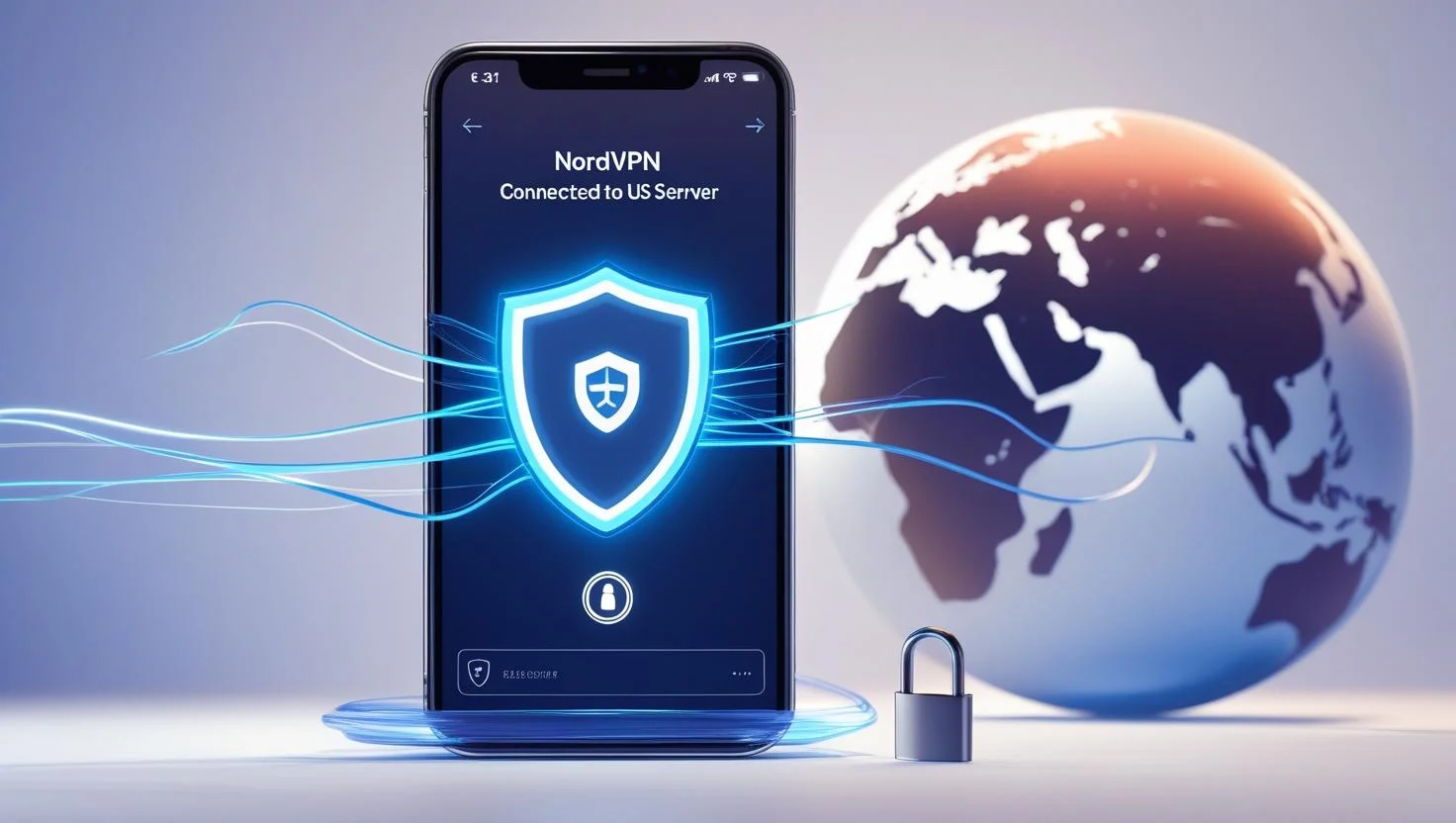
NordVPN stands out as the best VPN for iPhone in 2025, delivering a superb mix of speed, security, and iOS-friendly feature. Its iPhone app is very easy to use and packed with features, making it a top choice for both beginners and advanced users.
- Pros: Blazing-fast connections (thanks to its NordLynx/WireGuard protocol), 5,300+ servers in 60+ countries for excellent coverage, strict no-logs policy (independently audited)works with all major streaming services (Netflix, Disney+, Hulu, etc.) built-in ad/tracker blocking (Threat Protection), 6-device simultaneous use.
- Cons: Slightly more expensive than some rivals (monthly plans are pricy), limit of 6 devices per account, and the map-based interface can feel cramped on smaller screens (though you can use list view). No completely free plan (only a 7-day trial on iOS).
Privacy & Security:
NordVPN is based in privacy-friendly Panama and has a proven no-logs policy that has been verified by multiple independent audits. In fact, NordVPN logs nothing about your online activity – even they can’t see what you do. Security features are top-tier: 256-bit AES encryption, an automatic kill switch (to prevent data leaks if VPN drops), DNS leak protection, and even new obfuscated servers to bypass VPN blocks. Uniquely, NordVPN has introduced quantum-resistant encryption to future-proof your privacy. Bottom line – NordVPN provides bulletproof security for your iPhone’s internet connection.
Speed & Performance:
NordVPN is one of the fastest VPNs we tested. With the lightweight NordLynx protocol, it reached download speeds over 900 Mbps in testing – essentially it won’t slow down even a high-bandwidth 1 Gbps connection. In real-world use on an iPhone, NordVPN feels extremely fast: browsing and streaming in 4K HDR worked without buffering. If you have a slower network, NordVPN’s large network (5200+ servers across 59 countries) helps by avoiding overcrowding. It’s plenty fast for HD streaming, gaming, and video calls on your iPhone. (For best results, use NordLynx protocol; OpenVPN is available too but slower.)
Streaming & Apps:
This VPN is a great choice for streaming on iPhone. NordVPN reliably unblocks Netflix (multiple libraries), Amazon Prime Video, Disney+, HBO Max, BBC iPlayer, Hulu, and more. If you’re traveling, you can count on NordVPN to help your iPhone access your home content. The iOS app includes specialized servers for P2P/torrenting as well (though on iPhone you might rarely torrent). NordVPN’s app also offers split tunneling (to exclude certain apps from the VPN), which is handy if, say, your banking app doesn’t like VPNs.
NordVPN’s iOS app is highly rated at 4.7 out of 5 stars on the App Store, reflecting its reliability and user satisfaction. The interface on iPhone shows a world map and quick-connect button. It’s polished and stable – plus, NordVPN offers nice touches like Siri Shortcuts integration and dark mode support. You can also set it to auto-connect on cellular or Wi-Fi networks you deem risky.
Pricing:
NordVPN isn’t free, but it offers good value considering its premium features. There’s no free plan (aside from a 7-day free trial for mobile users). Regular pricing is around $12.99/month, but long-term plans are much cheaper – for example, the 2-year plan can be as low as $3.29 per month (often with extra months or gifts included). All plans come with a 30-day money-back guarantee, so you can try NordVPN risk-free. Also, if you sign up via the App Store on iPhone, you get a 7-day free trial before billing starts (just remember to cancel if it’s not for you).
Overall, NordVPN is the top all-around VPN for iPhone. It’s super fast, extremely secure, and works seamlessly for private browsing, streaming, and more. It gives iPhone users peace of mind on public Wi-Fi and the freedom to access content anywhere. NordVPN sets the bar for what an iOS VPN should offer in 2025 – it’s hard to go wrong with this choice.
2. Surfshark – Best Value iPhone VPN (Unlimited Devices)
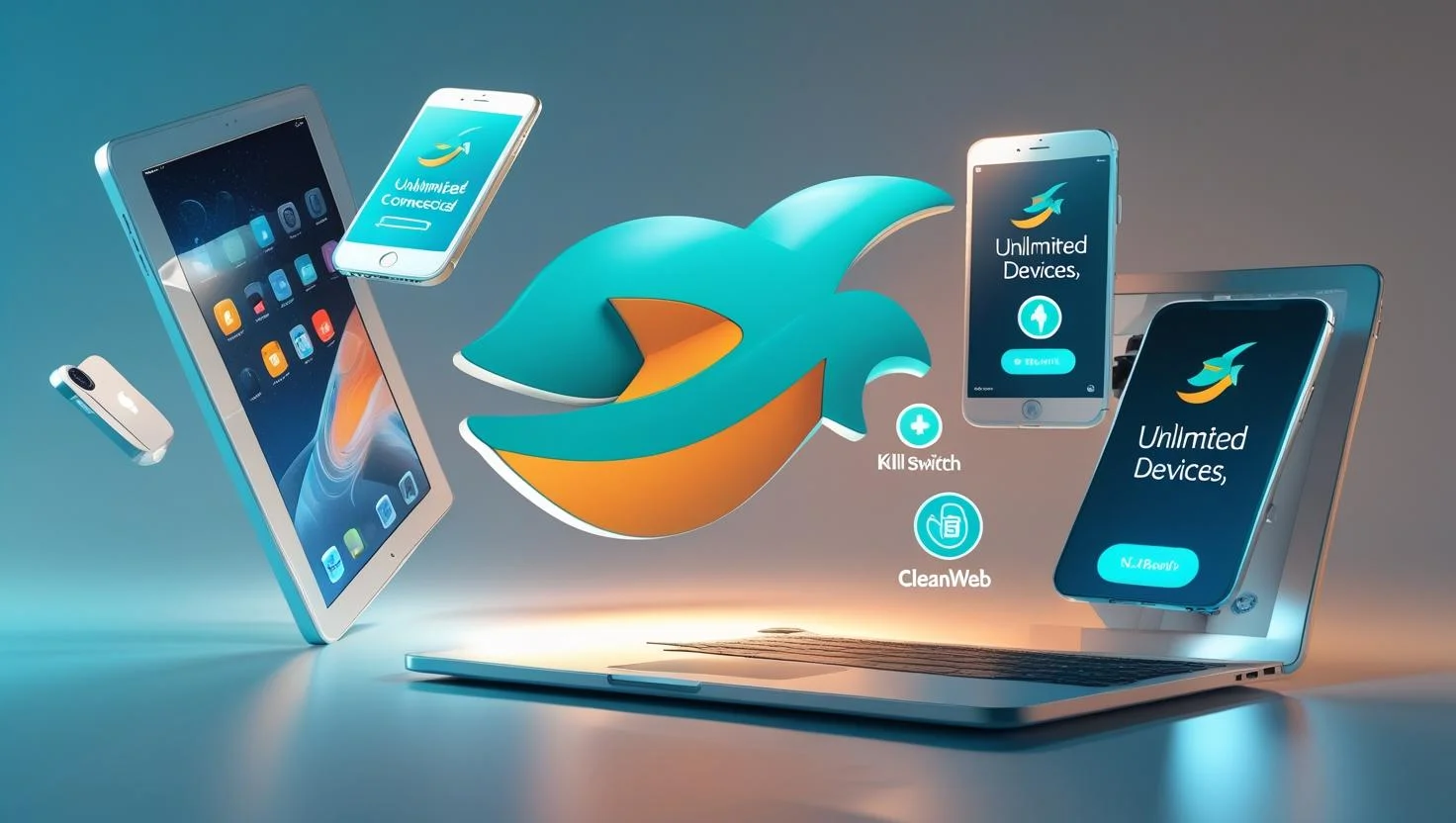
If you have multiple devices or want bang-for-buck, Surfshark is the best value VPN for iOS. It allows unlimited simultaneous connections, meaning you can use one account on your iPhone, iPad, Mac, and even share with family devices – all at once. Despite its budget pricing, Surfshark delivers premium features and performance that rival the big players.
- Pros: Unlimited devices per subscription (no other top VPN offers this), very affordable long-term plans, excellent speeds (WireGuard protocol up to 10 Gbps servers), strong security with AES-256 encryption and audited no-logs policy lots of privacy features (CleanWeb ad blocker, MultiHop double-VPN, split tunneling “Bypasser”), and reliable streaming support (works with Netflix, Amazon Prime, Disney+, etc.).
- Cons: Short-term prices jump higher (and renewal rates double after the initial term, so 2-year plan is best value), lacks some extras that competitors have (no dedicated IP option on iOS, for example), and its kill switch on iOS is on/off (can’t be customized by network as with some VPNs). Overall, very few cons given its price.
Surfshark’s iPhone app is sleek and user-friendly. It has a dark-themed interface with a big “Quick-Connect” button and a Locations list. One great perk: you can let Surfshark automatically pick the fastest server (often the “Recommended/Nearest” option) or manually choose from 100+ countries. We like that Surfshark includes special modes like MultiHop (route through two VPN servers for extra privacy) and a built-in VPN bypass (split-tunneling) feature – handy if you want certain apps to ignore the VPN. There’s even a feature called “Alternative ID” which can generate a fake email/identity for when you sign up to services, adding privacy (a unique perk of Surfshark). On iOS, Surfshark also supports Siri shortcuts, so you can automate VPN actions with your voice
Performance-wise, Surfshark is superb. It consistently ranks among the fastest VPNs thanks to its modern infrastructure and the WireGuard protocol. In independent tests, Surfshark retained over 90-93% of baseline speeds – sometimes even outperforming NordVPN on OpenVPN protocol. In everyday use, Surfshark on iPhone feels snappy: websites load quickly and HD/4K streams play smoothly. It’s also quite stable; we rarely experienced drops. If your connection does drop, the kill switch will kick in to prevent IP leaks. (Just note, kill switch is either on or off globally in settings; it’s simple but effective.)
Surfshark has a strict no-logs policy as well, meaning it does not collect or store identifiable data about your usage. This policy has been confirmed via an independent audit. The company is based in the Netherlands, which is part of the 14-Eyes countries, but its audited no-logs stance means even if requested, it has no data to hand over on your activities. For encryption, Surfshark uses top-tier protocols (WireGuard, IKEv2) and offers features like double VPN to bolster privacy. Security-wise, it’s on par with more expensive VPNs.
For streaming, Surfshark is excellent. In our tests, it unblocked Netflix (multiple regions like US, UK, JP), BBC iPlayer, Amazon Prime Video, Hulu, and other popular platforms without issues. One advantage is if you have unlimited connections, you can even set up Surfshark on your smart TV or other devices alongside your iPhone. The streaming performance is aided by Surfshark’s vast server network (3200+ servers globally) and no bandwidth limits. If one server is blocked by a streaming service, you can easily switch region or enable the built-in rotating IP feature.
Surfshark’s iOS app holds a 4.8-star rating on the App Store, indicating very positive user feedback (and probably reflecting the fact that it “just works” and is affordable). The app also offers a 7-day free trial for iPhone/iPad users – you can activate it on first install via the App Store, which is great to test it out.
Pricing:
Surfshark is arguably the cheapest VPN among top-tier services. It doesn’t have a free plan (aside from limited trial), but the pricing is its strong suit. The 24-month plan often costs around $1.99 to $2.49 per month, making it incredibly affordable for what you get. Keep in mind, as noted, that this price will rise upon renewal (to maybe around $4–5/mo), but even then it’s reasonable. Monthly plans are about $12.95 (similar to others). All plans include unlimited devices and a 30-day money-back guarantee. Given one subscription can cover your whole family’s phones, laptops, tablets, etc., Surfshark offers tremendous value.
In summary, Surfshark is the best budget VPN for iPhone users who don’t want to compromise on quality. It’s feature-rich, fast, and lets you protect every device you own with one account. If you’re after a private VPN app for iPhone that’s easy on the wallet, Surfshark is a top choice. Try Surfshark here – you even get a week free on iOS to see if you like it.
Surfshark at a glance: Unlimited connections, great for families; robust privacy features; super affordable long-term; minor downside is the higher renewal cost. With Surfshark, you can secure your iPhone and all other devices without breaking the bank.
3. ExpressVPN – Fast & Easy-to-Use VPN for iPhone
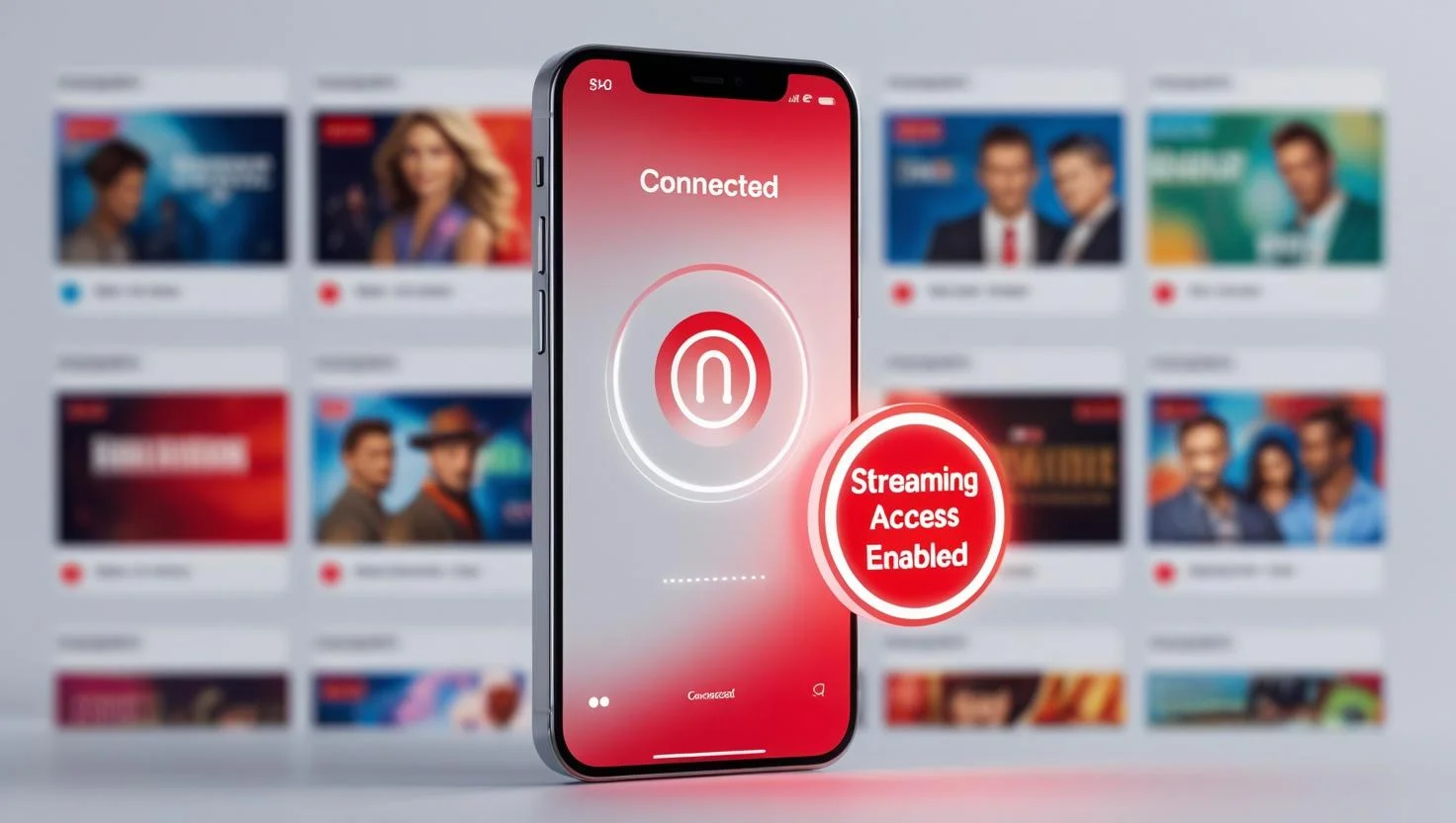
ExpressVPN has long been a big name in the VPN space, known for its premium service. On iPhone, ExpressVPN shines for its ease of use and excellent performance, especially for streaming. It’s a bit pricier than others, but if you value a polished app and a proven track record, ExpressVPN is a fantastic choice for iOS.
- Pros: Extremely simple to use on all platforms (great for VPN newcomers), top-notch privacy features and security (TrustedServer RAM-only servers, audited no-logs), servers in an unrivaled 105 countries – widest location selection of these top VPNs, consistently unblocks a huge range of streaming services (200+ platforms), and includes bonus features like a built-in password manager (ExpressVPN Keys) and Threat Manager to block trackers. Also offers 24/7 live chat support for any issues.
- Cons: More expensive than most rivals (especially on monthly plans), limit of 8 simultaneous devices (higher than before, but not unlimited), and the app while very clean is somewhat basic – advanced users might find fewer tweakable settings (e.g., no per-app split tunneling on iOS, etc.). No free plan or trial aside from the standard 7-day mobile trial.
ExpressVPN’s iOS app is about as straightforward as it gets. Upon opening, you see a big on/off button and a “Smart Location” suggestion (it picks an optimal server for you). You can also tap to choose other locations – ExpressVPN has servers in 105 countries, covering every continent, which is industry-leading. The app design is clean with an orange & white theme (and it now supports dark mode/Twilight theme as well). Notably, ExpressVPN managed to include a kill switch on iOS (Network Protection) which not all iPhone VPNs have due to platform restrictions – so if the VPN disconnects unexpectedly, your internet will pause to avoid leaks. This is a great feature for the security-conscious.
In terms of privacy, ExpressVPN is rock solid. It’s headquartered in the British Virgin Islands, outside any intelligence-sharing surveillance alliances. They have a strict no-logs policy that’s been verified through external audits and real-world tests. For instance, in a high-profile 2017 case, Turkish authorities seized an ExpressVPN server and found no useful data – testament to their no-logs claim. A key tech ExpressVPN pioneered is TrustedServer, meaning all their VPN servers run on volatile RAM and write no data to hard drives. Every time a server reboots, it wipes all information. This greatly reduces any risk of data persistence. Encryption is AES-256 (standard strong encryption) and ExpressVPN has its own Lightway protocol, which is open-source and designed for faster connection times and better reliability (similar aim as WireGuard, and it performs similarly well).
ExpressVPN is a top performer for speed. Its Lightway UDP protocol is extremely fast at connecting (almost instant) and provides high throughput. In our use, ExpressVPN handled 4K streaming and large downloads without noticeable slowdowns. Independent tests often show ExpressVPN among the leaders for speed retention and low latency. If you have a high-speed internet connection on your iPhone (e.g., 5G or fiber Wi-Fi), ExpressVPN will take full advantage. And if you’re on a slower network, Express still optimizes well (you likely won’t notice much difference vs not using a VPN for regular browsing).
Where ExpressVPN truly excels is streaming and geo-unblocking. It’s often dubbed the “premium streaming VPN” – and for good reason. ExpressVPN reliably unblocks Netflix (all regions we tried, though occasionally one might need a server hop), BBC iPlayer, Hulu, Disney+, HBO, Amazon Prime, and many more. In fact, ExpressVPN claims over 200 streaming services are accessi Even niche platforms or regional channels tend to work. It also has a MediaStreamer DNS feature as a backup, which can help in cases where a device (like Apple TV) can’t run VPN – though on iPhone you’ll just use the app normally. If streaming is your main goal, ExpressVPN is arguably the top pick for its consistency. (Note: In some recent tests, a couple of services like ITVX or Netflix AU detected the VPN, but switching servers resolved it. ExpressVPN’s vast network usually has an alternative that works, and their support can guide you to the right server if needed.)
Security extras:
ExpressVPN’s Threat Manager on iOS (recently added) works like a lightweight blocker for malicious domains and trackers – it can prevent apps from sending data to known trackers. There’s also a nifty feature where you can change the app icon (for discretion or aesthetics) and localized app language support for 17 languages. These small touches show ExpressVPN’s attention to user experience.
App Store Rating:
ExpressVPN’s iOS app is rated 4.7★ out of 5 with hundreds of thousands of reviews, indicating a very positive reputation. Users praise its simplicity and reliability. It’s frequently updated (we saw an update in July 2025 focusing on stability).
Pricing:
As mentioned, ExpressVPN is on the premium end cost-wise. There’s no permanent free version. They do offer a 7-day free trial for iPhone users (activated through the App Store subscription) – be aware it auto-renews to a paid plan if not canceled. Regular pricing is ~$12.95 per month. The 12-month plan + 3 months free (15 months total) is usually the best deal, averaging about $6.67 per month. There’s also sometimes a 24-month special around ~$5-6/mo effective. All plans come with a 30-day money-back guarantee, so you can refund if not satisfied. ExpressVPN knows it’s pricier, and they often justify it by including those extra tools (password manager, etc.) and by highlighting that competitors with similar bundles (NordVPN’s full bundle, for example) can cost even more If you want top-notch quality and are willing to invest a bit more, many feel ExpressVPN is worth it.
To sum up, ExpressVPN is a fantastic iPhone VPN, especially if you prioritize ease of use, streaming power, and a strong privacy pedigree. It’s the “it just works” VPN – minimal fuss, maximum performance. The only real downside is cost, but if you don’t mind paying for premium quality, you’ll likely love ExpressVPN on your iPhone. For many users, the peace of mind and smooth experience ExpressVPN provides justifies the price.
4. ProtonVPN – Best Free VPN for iPhone (and Security Focused)
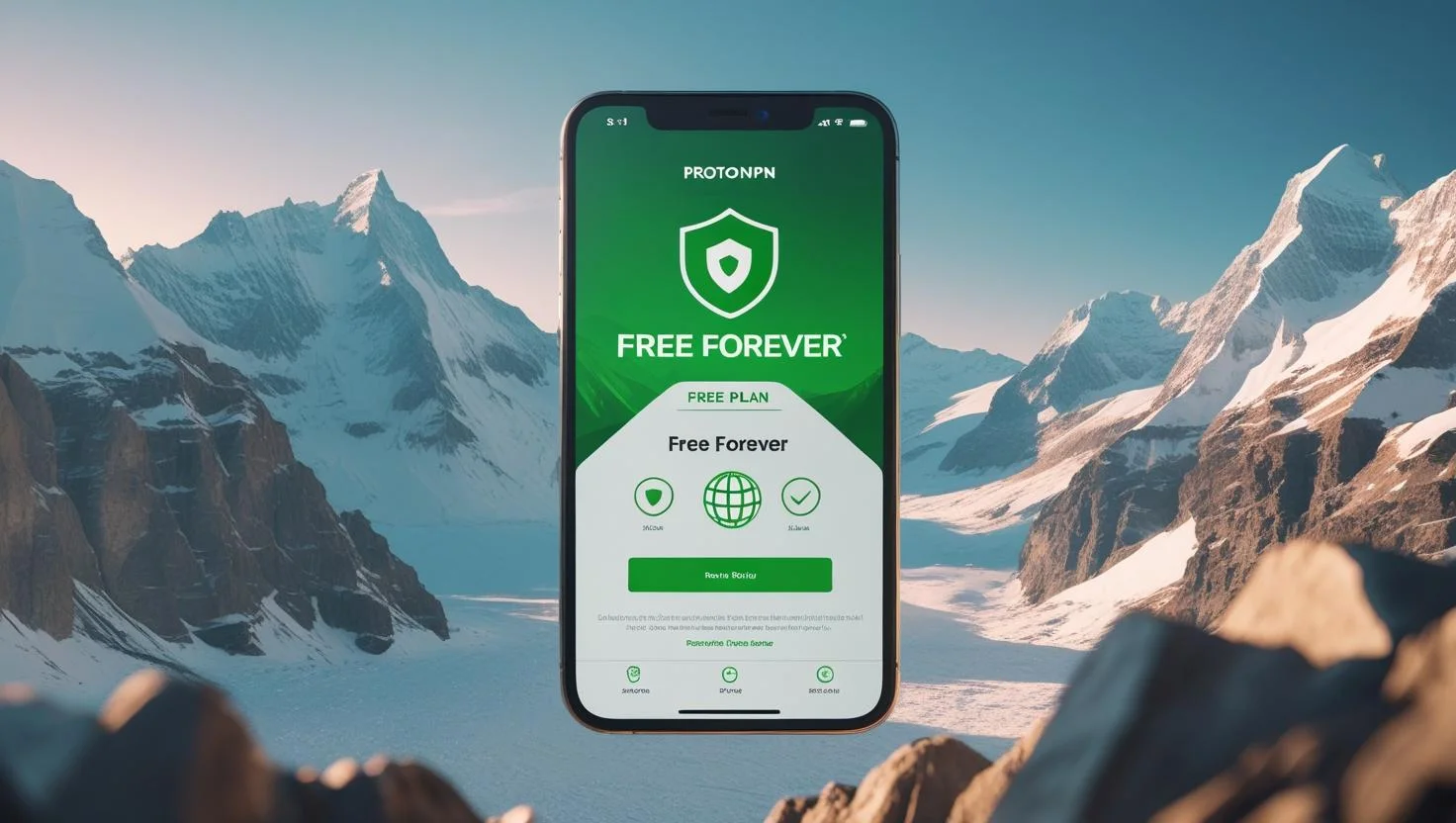
If you need a free VPN for iPhone that is actually safe and usable, ProtonVPN is the top recommendation. ProtonVPN is developed by the CERN scientists behind ProtonMail, and it’s built with a security-first mindset. The big draw: ProtonVPN’s free plan for iOS has unlimited data – no 500MB or 10GB monthly cap, unlike most free VPN. This makes it the best free iPhone VPN option, although with some limitations.
- Pros: Truly free plan available (unlimited bandwidth, no time limit) – great for basic protection or occasional use, strong privacy credentials (based in Switzerland, very strict no-logs policy, open-source apps), premium version offers excellent security features (Secure Core double-hop servers, NetShield ad/tracker blocker, etc.), allows up to 10 devices on paid plans, and very good speeds on paid servers (10 Gbps capable network). No ads or data selling on any plan.
- Cons: Free plan has limited servers (only 3 countries: US, Netherlands, Japan) and medium speeds (ProtonFree users have lower priority, so speed can drop at busy times), no streaming support on free (Netflix and other streaming require a Plus/Premium plan), premium pricing is a bit higher than some (month-to-month is pricey, but 2-year is reasonable). The Proton iOS app is highly secure but sometimes “fiddly” – meaning there are advanced options which could confuse casual users (for example, toggling protocols or setting up Secure Core routes).
For privacy hawks, ProtonVPN is a dream. It’s headquartered in Switzerland, which has strong privacy laws and is outside EU/US jurisdiction. ProtonVPN keeps absolutely no logs of user activity – even connection timestamps are not stored. They have undergone independent security audits and all their apps (including the iOS app) are open source, with code available for anyone to inspect. This transparency is a big trust factor. The service also has advanced security: one highlight is Secure Core, which routes your traffic through a hardened network (for example, through privacy-friendly countries like Switzerland or Iceland) before exiting to the final server. This double-hop design mitigates the risk of a VPN server in a high-risk country being monitored, as an adversary would have to break through multiple layers. Secure Core is available to Plus (paid) users and can be toggled in the app.
ProtonVPN’s iPhone app is clean and modern (it got a big update in late 2024). It has a world map interface (similar to Nord’s) and a list of servers. Free users see a subset of servers marked “Free.” You can connect with one tap. No ads or nags for free users, which is wonderful – just occasional upsell banners for Proton’s other products (Mail, etc.) but very minimal. The app supports IKEv2, WireGuard, and even OpenVPN (UDP/TCP) protocols – giving advanced users flexibility. One quirk: ProtonVPN’s free servers can get a bit crowded, so sometimes you might need to try a couple of free server connections to get the best speed. But it’s unlimited data, so many accept a slower speed in exchange for the cost of $0.
In our tests, ProtonVPN Free typically gave around 5–10 Mbps speeds, which is fine for standard definition streaming, messaging, browsing. It might struggle with HD streaming or large downloads, but remember streaming services are mostly blocked on the free servers anyway. ProtonVPN Plus (Paid), on the other hand, is very fast – we saw only about a 7% drop in download speed on a 60 Mbps line, one of the best results among VPNs. And its premium servers, especially when using WireGuard, can achieve hundreds of Mbps easily. If speed is critical, upgrading might be worth it, but if basic usage is your aim, free is workable.
Streaming:
The free tier of ProtonVPN does not support streaming services – those providers typically block the free servers. If you need Netflix or Disney+, you’ll have to upgrade to a Plus plan, which has “Plus” servers optimized for streaming. Proton’s paid servers successfully unblocked Netflix, Amazon Prime, Disney+, and BBC iPlayer in our trials – ProtonVPN is quite capable as a streaming VPN on its paid tier. Just be aware it doesn’t have as many country options as, say, ExpressVPN or NordVPN. ProtonVPN covers ~65 countries for Plus users, which is still very good.
Security features available (for paid users) in ProtonVPN’s iOS app include NetShield, which is an excellent DNS-based ad-blocker and malware protector. Enabling NetShield will block ads and trackers system-wide when connected – a big perk for mobile browsing. ProtonVPN also supports Tor over VPN (you can connect to a special server that automatically routes through the Tor network – useful if you need to access .onion sites or want that extra layer). And of course, the kill switch feature (“Always-on VPN”) is present to prevent leaks if connection drops.
App Store Rating:
ProtonVPN’s app at Apple Store has about 4.6★ out of 5 from tens of thousands of users. People love that the free version is genuinely useful and that the company is trustworthy. Some negative reviews mention speed issues on free or occasional connection hiccups, but ProtonVPN’s team often responds to help.
Pricing:
ProtonVPN’s Free plan requires no credit card – just create a free account and you can use it indefinitely on one device at a time. Paid plans come in two levels for individuals: Basic (which they are phasing out, it was a cheaper limited plan) and Plus (full features). Realistically, new signups choose Plus. It costs around $9.99/month if paid monthly. The 1-year plan is about $5/month, and the 2-year plan can get down to around $3.99/month (sometimes with extra months). More expensive than Surfshark, but remember you’re also supporting a company that offers a generous free service. One Proton account can be used on 10 devices simultaneously (even the free has 1 device, Basic had 2 devices, Plus has 10). They also bundle offerings (Proton Unlimited) that include ProtonMail, Drive, etc., if you’re interested in an all-in-one privacy suite. All paid plans have a 30-day prorated refund policy (they refund the unused portion of your subscription).
In conclusion, ProtonVPN is the top recommendation if you specifically want a free iPhone VPN or if you’re privacy-obsessed and willing to invest in a provider with an excellent ethos. The free plan will cover light usage needs securely (and without the sketchy practices other free VPNs might have), while the paid plans unlock a truly powerful VPN experience on par with the best. For many casual users, ProtonVPN free on an iPhone can be a set-and-forget solution for basic encryption – no cost, no data limits, no ads (as one NordVPN reviewer aptly warned, “free VPNs…sell your data…the OPPOSITE of why you use a VPN” – ProtonVPN is a rare exception to that). . It’s a great way to secure your iPhone without paying a dime, backed by a highly reputable team.
5. AtlasVPN – Budget VPN (Now Part of NordVPN)
AtlasVPN users take note: AtlasVPN was a popular low-cost VPN (with a decent free plan) that many used on iPhone. However, as of April 2024, AtlasVPN has been discontinued and is no longer operating as an independent service. The company announced that due to competitive and technical challenges, they shut down and migrated all AtlasVPN users to NordVPN (Atlas’s parent company)said, it’s worth discussing AtlasVPN’s legacy and what options exist now:
- Pros (when it was active): Offered a free plan (with about 5 GB monthly data and 3 server locations) and extremely cheap multi-year subscriptions (often ~$1.99/month on 3-year term), had a simple iOS app suitable for beginners, allowed unlimited devices, and provided solid speed on WireGuard. AtlasVPN also maintained a no-logs policy and was owned by Nord Security (same parent as NordVPN), which gave it some credibility. It could unblock Netflix US, BBC iPlayer, and a few other streaming services in our past tests – making it a great bargain VPN for streaming on a budget.
- Cons: Smaller server network (~750 servers in ~37 countries, far fewer than top providers), missing some advanced features (no split tunneling or dedicated IP options, etc.), no native protocol choice (it primarily used IKEv2 on iOS), and since it was US-based, it lived under potential 5-Eyes jurisdiction (though it claimed strict no-logs). The biggest “con” now is that the service no longer exists – as a user, you can’t sign up for AtlasVPN in 2025.
What happened to AtlasVPN?
In short, the VPN market is very competitive, and maintaining a quality service at super-low prices is tough. In early 2024, AtlasVPN’s team cited “insurmountable challenges” like rising infrastructure costs and heavy competition as reasons for shutting down. All paying users were offered transitions to NordVPN (with equivalent remaining subscription time). Free users simply lost access after the closure date. This consolidation isn’t unheard of – it underscores that “free or ultra-cheap VPNs” can be hard to sustain long-term. It’s a reminder that, often, paying a little for a trusted VPN is worth it for longevity and quality.
Alternatives:
If you were considering AtlasVPN for its free plan or ultra-budget pricing, here’s what we suggest now:
- For a free VPN on iPhone, ProtonVPN (mentioned above) is now the best choice (unlimited free tier, very safe). Windscribe and TunnelBear have small free data allowances that might be enough for light use. Avoid completely unknown “free VPN” apps that lack transparency – many of those come with privacy risks.
- For a cheap paid VPN, Surfshark offers a similar price point to what AtlasVPN had, especially on 2-year deals (and Surfshark has far more features). Also, deals from NordVPN itself are available – ironically, Nord’s 2-year price with current discounts isn’t far off from Atlas’s old price, and NordVPN is a superior service in every aspect (plus existing Atlas users are now Nord users). Another to consider is Private Internet Access (PIA), which often has 3-year deals under $2.5/mo and supports unlimited devices as Atlas did.
- If you were an AtlasVPN user: by now, your account should have instructions to use NordVPN. NordVPN’s app is different but overall a big upgrade (just with device limit of 6, which is the one thing Atlas had beat).
It’s a bit unfortunate to see AtlasVPN go, as it served a niche of budget-conscious users and had decent performance. But the upside is that its user base got moved to one of the top VPNs (NordVPN) for the remainder of subscriptions. NordVPN also honored Atlas add-ons and gave discounts to Atlas users for switching.
AtlasVPN App Rating;
Before shutdown, AtlasVPN’s app enjoyed around 4.8★ rating on the App Store and 4.5★ on Google Play, which indicated users were quite satisfied with it. The iOS app was simple: a one-button connect interface with a location list. It lacked a kill switch on iOS (you had to rely on iOS 15’s built-in “VPN reconnect” feature), and some features like SafeBrowse (malware blocking) were available.
In summary, AtlasVPN (as a standalone service) is no longer available. If you come across references to it as a “best iPhone VPN,” know that information is outdated. Instead, consider the other secure iPhone VPN options we’ve covered. They might cost a bit more than “free,” but they will be around for the long haul and give you better service.
For former AtlasVPN fans, NordVPN is the closest spiritual successor (since it’s literally the service Atlas merged into). NordVPN has a very low-cost option if you catch it on sale, and you’ll get a far more robust VPN for your iPhone with that.
Bottom Line: AtlasVPN’s chapter has ended, but you can still secure your iPhone affordably. We recommend going with a reputable provider like NordVPN, Surfshark, or ProtonVPN’s free tier, rather than hunting for another obscure free VPN. A VPN is critical security software – it’s worth choosing one with a solid track record.
(No direct “Download” link for AtlasVPN, since it’s discontinued. If you search the App Store, you’ll find it’s been removed. Instead, check out NordVPN which now covers AtlasVPN users.)
Now that we’ve covered the top VPN choices, let’s quickly go over how to set up a VPN on your iPhone or iPad, and then compare free vs paid VPNs in case you’re still on the fence about upgrading.
How to Install and Use a VPN on iPhone (Step-by-Step Guide)
Getting a VPN up and running on your iPhone is easy. You have two main methods: 1) Using a dedicated VPN app (recommended for most users), or 2) Manually configuring a VPN in iOS Settings (for advanced users or specific setups). We’ll outline both:
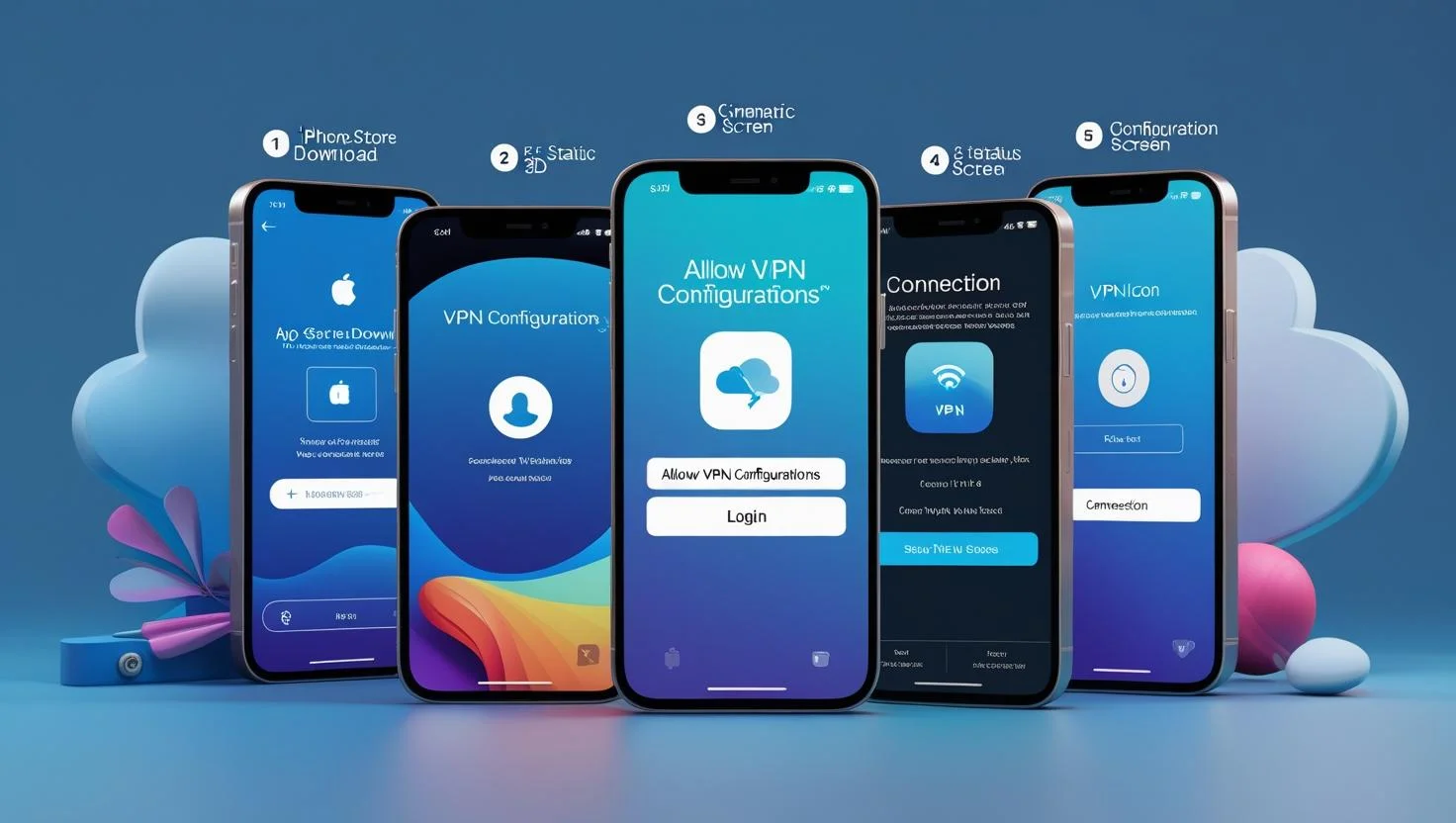
Method 1: Install a VPN App from the App Store (Easy)
This is the simplest way and gives you full feature access (like one-tap connect, server list, etc.). For example, let’s say you choose NordVPN (process is similar for others like Surfshark, ExpressVPN, etc.):
- Sign Up for a VPN service. First, pick your VPN and create an account. You can do this on their website or within the app. (If it’s a paid VPN, choose your subscription plan; if it’s free like ProtonVPN Free, just make an account.)
- Download the VPN app on your iPhone. Go to the App Store and search the VPN’s name (e.g., “NordVPN”, “Surfshark”, “ExpressVPN”, “ProtonVPN”). Tap “Get” to install the app.
- Open the app and log in. Launch the VPN app and sign in with the account credentials you created. The first time, it may also show a quick tutorial.
- Allow VPN configurations. The app will prompt “`[App Name] would like to Add VPN Configurations”**. Tap “Allow”. You may need to confirm with Face ID/Touch ID or your passcode. This is an iOS security step that lets the app create the VPN profile on your device.
- Connect to a VPN server. In the app, select a location or use any “Quick Connect” button. The first time you connect, iOS will ask to confirm you trust the app for VPN connections – agree/continue. After that, the VPN will connect. You’ll know it’s on when you see a “VPN” icon 🛡️ at the top of your iPhone’s status bar (or Control Center) next to the network signal.
- You’re protected! Once connected, all your internet traffic is encrypted and going through the VPN. Leave the app running in background. You can now use your iPhone normally – the VPN stays on. (If the VPN ever disconnects, you’ll get a notification; and if the app has a kill switch, it will block traffic until reconnected.)
- (Optional) Adjust settings if needed. VPN apps let you tweak things like auto-connect on Wi-Fi, choose VPN protocol (WireGuard/OpenVPN), enable features like ad-blocking, etc. Explore the settings to suit your needs. But the default settings are usually fine for most people.
That’s it – using the app method, it’s very straightforward. Anytime you want to use the VPN, just open the app and tap connect (or some apps support Siri Shortcuts like “Hey Siri, connect VPN”). Many VPN apps also can auto-reconnect if you switch networks or if your iPhone restarts, if you enable those options.
Pro Tip: You can enable “Connect on Demand” or “Auto-Connect” within most VPN apps so that the VPN will automatically engage on certain networks (like any Wi-Fi that is not your home). For instance, NordVPN and others have an auto-connect feature for unsecured Wi-Fi – great for ensuring you’re always safe on public hotspots without remembering to turn it on.
Method 2: Manually Configure a VPN in iOS Settings (Advanced)
iOS allows manual VPN configurations using protocols like IKEv2, L2TP/IPsec, or via installing configuration profiles (for OpenVPN/WireGuard). You might use this method if your VPN provider offers manual config files or if you need to connect to a workplace VPN.
Here’s how to set up an IKEv2 or L2TP VPN manually on iPhone:
- Obtain the VPN settings from your provider. You’ll need the server address, remote ID, and a username/password (or certificate) from your VPN service. For example, ProtonVPN provides profiles for IKEv2 manual setup on their website
- Install certificate (if required). If using IKEv2 with a certificate, you may have to download the .p12 certificate file and install it on your iPhone. (Open it, and iOS will prompt you to install profile.) Many commercial VPNs don’t require this step unless they use a custom CA.
- Go to iPhone Settings > VPN. On iOS 15 and above, it’s under Settings > General > VPN & Device Management > VPN. Tap “Add VPN Configuration…”.
- Enter the details: Choose the VPN type (IKEv2, IPSec, or L2TP). Then fill in the fields: Server (e.g., us.vpnserver.com), Remote ID (often same as server host or a domain given by provider), and Local ID (usually leave blank). Enter your account Username and Password for the VPN (or if using certificate, select it after installing). For IKEv2, also toggle Use Certificate if needed and pick the certificate.
- Save the configuration. Tap Done. Now you’ll see the VPN profile listed.
- Connect via Settings. Toggle the switch next to the VPN profile to connect. Once connected, the status will show “Connected” and the VPN 🛡️ icon will appear on the top of your screen.
- Disconnect from Settings when needed. You can turn off the VPN by toggling the switch off. iOS will remember the profile, so you can reconnect anytime from Settings (or even from Control Center if you add the VPN toggle to it).
Manual setup is a bit technical and lacks the on-demand intelligence of apps (for example, apps can auto-pick fastest servers, whereas your manual config is fixed to whatever server you entered). However, it’s useful for certain scenarios:
- Using a VPN that has no native iOS app (some small business or university VPNs).
- Setting up a specific protocol not offered in the app or customizing encryption parameters.
- Setting up a personal VPN server you control (e.g., using Algo VPN or Streisand or Outline).
Most readers here will prefer using the app method, and we recommend it – it’s simpler and you won’t miss out on features like kill switch or multi-hop which usually aren’t available via manual configs.
Finally, whichever method you use, once your VPN is set on your iPhone, remember to keep it connected whenever you want protection. You can leave it on all the time (many do – it shouldn’t significantly affect battery life if using modern protocols; there might be a slight battery hit, but on recent iPhones it’s manageable). Or just turn it on as needed (e.g., when you hop on public Wi-Fi or when you want to stream geo-blocked content).
In the next section, we’ll discuss the differences between free and paid VPNs on iPhone, so you can make an informed decision on which route to go.
Free vs. Paid VPNs for iPhone – What’s the Difference?
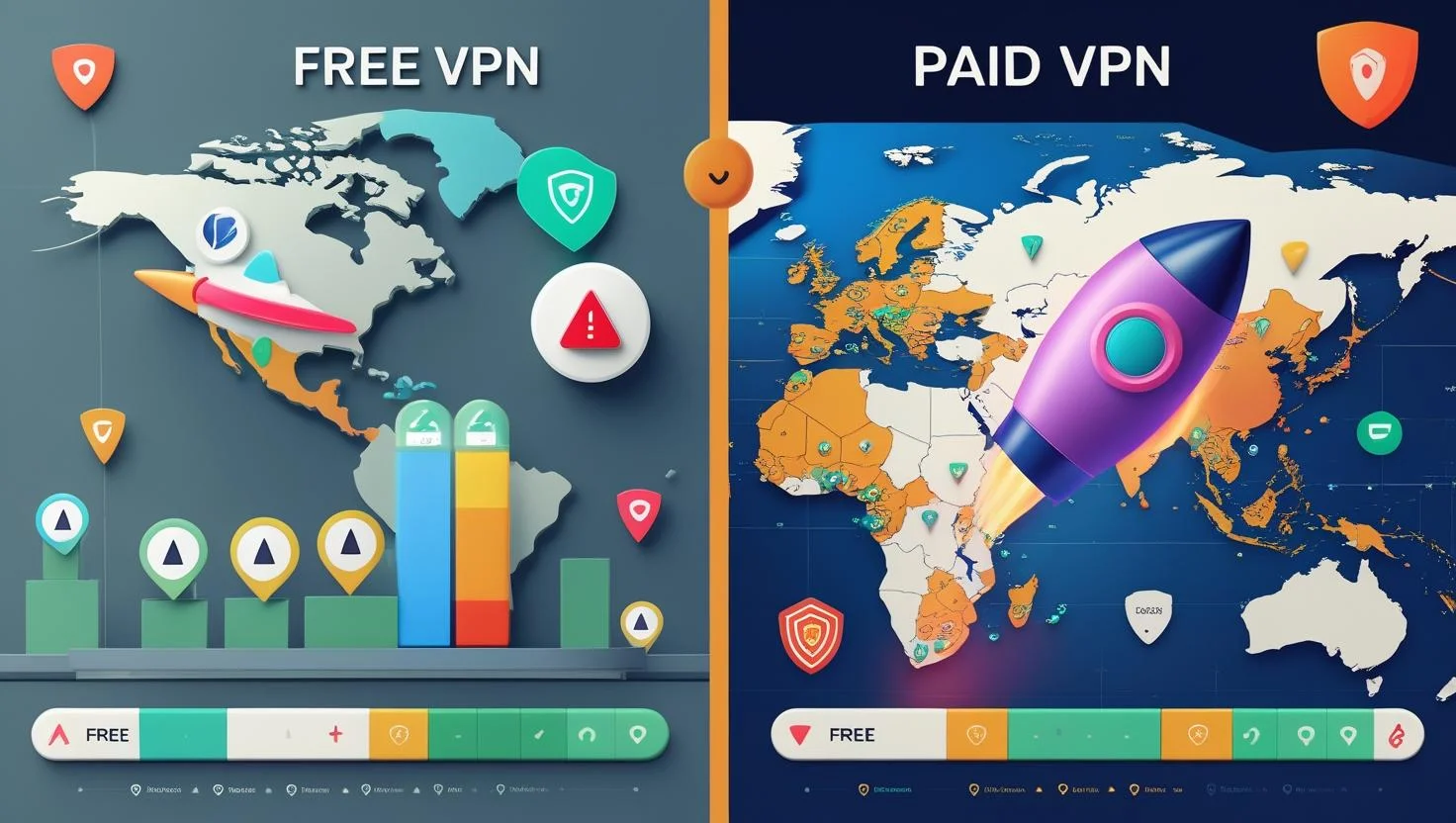
You might be wondering: “Do I really need to pay for a VPN? There are free VPN apps out there.” It’s true – both free and paid VPNs exist for iPhone. However, there are significant differences in quality, privacy, and performance. Let’s break it down, so you know what to expect with each, and why we generally recommend premium VPNs (with some exceptions like ProtonVPN Free).
Free VPNs on iPhone – Pros & Cons: A free VPN might be suitable for very casual or infrequent use, but there are trade-offs. The biggest advantage is $0 cost – you don’t have to subscribe, and some don’t even require an account. But most free VPNs come with limitations: very restricted data caps (e.g., 500 MB per month on TunnelBear’s free plan), few server locations (often just 3-5 countries), slower speeds (free users are throttled or on crowded servers), and no guarantee of privacy. In fact, many free VPNs make money by showing you ads or, worse, by collecting and selling your browsing data (which defeats the whole purpose of a VPN). You should be extremely cautious with completely free VPN apps from unknown developers – some have been found to contain malware or engage in dubious data practices.
That said, reputable companies (like ProtonVPN, Windscribe, Hide.me) do offer limited free tiers as a goodwill gesture or marketing funnel for their paid plans. Those are generally safe to use, but come with the performance limits mentioned.
Paid VPNs – Pros & Cons: A paid VPN requires a subscription, but in return you get the full experience: unlimited data, full speed servers, wide choice of locations, and all advanced features (streaming unblocking, malware filtering, multi-hop, etc.). Critically, paid VPNs have a clear business model (your subscription), so they typically have no incentive to log or sell your data – their reputation depends on safeguarding user privacy. Top paid VPNs invest in security audits, infrastructure, and support, which free services often can’t afford. The downside of paid VPNs is, well, the cost. However, the cost can be quite low – many top VPNs end up costing just ~$2-5 per month on a deal, which for many is worth the security and peace of mind.
Comparison key aspects in a quick table:
| Aspect | Free VPN (Typical) | Paid VPN (Premium) |
|---|---|---|
| Cost | $0 (but you might be the product) | Subscription (e.g., ~$2–$12/month depending on plan) |
| Data Limit | Usually limited (500MB to 10GB/month) | Unlimited data/bandwidth |
| Speed | Often throttled or slow during peak times | High-speed servers (minimal speed loss) |
| Server Locations | Very few (Free plans: ~3–5 locations) | Global coverage (50+ countries often) |
| Streaming | Rarely works (most streaming sites block free VPN IPs) | Optimized for streaming (Netflix, etc. unblocked) |
| Privacy | Varies: some log and sell data (be wary!) | Strict no-logs policies; audited for compliance |
| Security Features | Basic encryption only; usually no extras | Full features: kill switch, split-tunnel, malware blocker, multi-hop, etc. |
| Support | Little to none (no support or only email) | 24/7 customer support (live chat, email) |
| Examples | ProtonVPN Free (trusted, unlimited data), Windscribe Free (10GB), TunnelBear Free (500MB) | NordVPN, Surfshark, ExpressVPN, ProtonVPN Plus, etc. |
As shown above, the gap between free and paid VPNs is pretty big. Free can suffice if you just need to occasionally check email on public Wi-Fi or bypass a simple website block. But if you plan to use a VPN regularly – for streaming, for daily privacy, for traveling – a paid VPN is absolutely worth it for the vastly better experience.
When is a free VPN okay?
If you truly cannot pay or just want to try out VPN functionality, use one of the reputable free offerings. For instance, ProtonVPN’s free plan is the standout since it has no data cap (you could run it all month, just limited to slower servers). It’s funded by Proton’s paid users, so it’s a trustworthy service (no ads, no selling data). Just remember it won’t unblock streaming and may be slow at times. Windscribe’s free 10GB is also decent if you need a bit more speed, but 10GB won’t last if you stream or download a lot. Always read what data they collect – good ones will be transparent (e.g., ProtonVPN Free doesn’t log anything identifiable either, just enforces limits).
Many free VPN apps on the App Store with names like “Super VPN” or “Free Unlimited VPN” have been caught embedding trackers or misusing user data. Some have even leaked user data due to poor security. Free providers also might not invest in strong encryption or up-to-date protocols, making them less secure. There’s also the annoyance factor: some free VPNs bombard you with ads or force you to watch video ads to gain more time or data usage. It can be a pretty frustrating experience.
On the other hand, a paid VPN typically delivers what you expect: fast, always-on protection without hassle. Also, premium services often maintain no-logs as a core principle – many have undergone audits to prove it, something a free app is unlikely to do. Paid VPNs can also afford to implement cutting-edge tech (like the latest ciphers, VPN protocols, server upgrades, etc.) to improve user experience.
Our recommendation:
If you’re serious about privacy and will use the VPN a lot (for travel, work, streaming, etc.), choose a good paid VPN. The cost is relatively low and there’s usually a money-back guarantee if you’re not happy. If you just need a VPN occasionally, a free plan from a trusted provider can do the job – just temper your expectations and understand the limits. Avoid sketchy free VPNs – they are risky for your data.
Many paid VPNs we discussed (NordVPN, Surfshark, ExpressVPN) also have trial periods or money-back guarantees, so you can effectively test them for free for 7 to 30 days. This might be a better approach than using a crippled free VPN indefinitely.
In short, free VPNs have convenience but come with restrictions, while paid VPNs unlock the full power of a VPN for your iPhone. Given how much we use our iPhones for sensitive communications, investing in a reliable VPN service is a smart move for security.
For more detailed analysis, check out our article on Free vs Paid VPNs (pros, cons, and which free VPNs are safe to use).
FAQs – iPhone VPNs
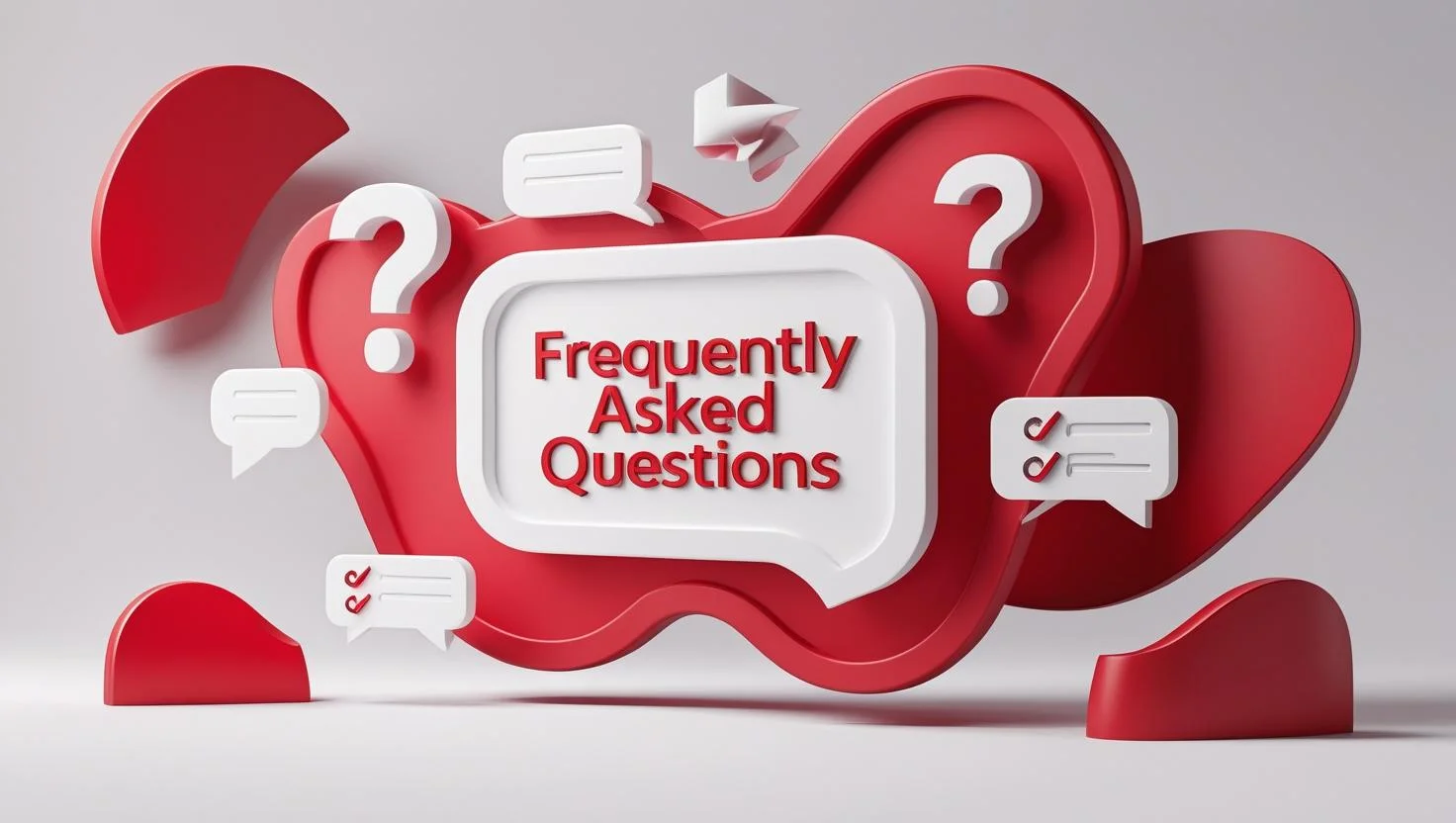
Q1: What is the best VPN for iPhone in 2025?
A1: Based on speed, security, and features, NordVPN is the best overall VPN for iPhone in 2025. It offers top-tier encryption, a strict no-logs policy, and an easy one-tap iOS app that’s super fast and reliably unblocks streaming content. Other top contenders are Surfshark (best value with unlimited devices), ExpressVPN (premium option with many countries and great ease of use), and ProtonVPN (best free VPN for iPhone). Any of these are trustworthy and effective – the “best” ultimately depends on your needs (e.g., budget vs. features), but NordVPN is a safe bet for most users.
Q2: Are VPNs safe for iPhone?
A2: Yes – using a reputable VPN on your iPhone is safe and will enhance your privacy. iOS is very VPN-friendly and has built-in support for it. All the VPNs we listed (NordVPN, ExpressVPN, etc.) are safe to use on iPhone; they use strong encryption (AES-256) so your data is secure. Just make sure to choose a trusted VPN provider. The VPN apps on iPhone run in a sandbox and require your permission to add VPN configurations, which is normal. As long as you avoid unknown or suspicious free VPN apps (which might misuse data), running a VPN on iOS is secure and even recommended for protecting your traffic.
Q3: Is there a truly free VPN for iPhone that’s good?
A3: ProtonVPN’s free plan is likely the best truly free VPN for iPhone. It has no data cap (unlimited use) and is from a reputable privacy company The downsides: it’s slower and doesn’t support streaming on the free servers. Other decent free options are Windscribe (10 GB/month free) and Hide.me (10 GB/month) – they have data limits but relatively good speeds and privacy practices. TunnelBear offers only 500 MB/month free – only useful for very occasional use. Remember, with free VPNs you’ll often face limits in speed and servers, and many popular free VPN apps in the App Store can be risky. Stick to well-known providers’ free tiers. And if you find yourself needing more, consider upgrading to a paid plan for the full benefits.
Q4: How do I set up a VPN on my iPhone?
A4: The easiest way is to download the VPN’s app from the App Store, log in, and tap connect. We provided a step-by-step guide above. In summary: choose a VPN service, install its iOS app, allow it to add VPN configurations, then use the app’s connect button to start the VPN. You’ll see a “VPN” icon on the top status bar when it’s on. Alternatively, you can go to Settings > VPN > Add VPN Configuration and enter details manually if you have them (for example, for a work VPN or a custom setup), but for most users the app is simpler and gives access to all features like auto-reconnect and server selection.
Q5: Does iPhone have a built-in VPN? (Is iCloud Private Relay a VPN?)
A5: iPhones don’t come with a traditional VPN service built-in. iCloud Private Relay, introduced by Apple, is not exactly a VPN – it encrypts and sends your Safari browsing traffic through two relays (to hide your IP and DNS queries), but it only works in Safari and Mail (not all apps), and it doesn’t allow you to choose server locations (it will only approximate your region). It also doesn’t hide your traffic from Apple’s own relay. So, Private Relay is a nice privacy feature if you have iCloud+, but it won’t replace a VPN for most users. To secure all your internet traffic on an iPhone (including all apps) and to appear from different countries, you’ll need to use a VPN app. The good news is iOS fully supports VPNs and makes it easy to use them – but you do have to install one.
Q6: Will a VPN slow down my internet on iPhone?
A6: Using a VPN can slightly reduce your internet speed due to encryption overhead and the longer path your data travels (through the VPN server). However, with a good VPN, the speed loss is usually minimal – often not noticeable for everyday browsing. For instance, in tests NordVPN and ProtonVPN both retained over ~85-90% of baseline speeds on fast connections. Modern protocols like WireGuard (NordLynx, etc.) are very efficient. On a 100 Mbps Wi-Fi, you might still get 80-90+ Mbps with a top VPN, which is plenty for HD streaming, FaceTime, etc. You may see higher latency (ping) by a few tens of milliseconds if connecting to a far server. If speed is critical (e.g., low ping for gaming), you can always connect to a nearby VPN server to minimize impact. Tip: If a certain VPN server is slow, try another or use the VPN’s recommended server feature. Also, avoid free VPNs if speed matters – those tend to be slow. Overall, on a good paid VPN, the speed difference on iPhone is small, and often worth the security trade-off.
Q7: Can I use the same VPN subscription on my iPad/Mac?
A7: Usually, yes. Most VPN services allow multiple or unlimited simultaneous connections. For example, NordVPN allows 6 devices at once, Surfshark and PIA allow unlimited, ExpressVPN allows 8 ProtonVPN Plus allows 10. This means with one account, you can install the VPN app on your iPhone, iPad, Mac, and other devices (Android, PC, etc.) and use them together. So you don’t need separate subscriptions for your different Apple devices. Just download the appropriate app or software and log in with the same account. Note: If you got your VPN via an in-app purchase (Apple Subscription), you may need to retrieve credentials for other platforms – but all major VPNs have a way to use your account on any device regardless of how you subscribed (sometimes via an account dashboard). Check the provider’s instructions in such cases.
Now that you have all the information, you’re ready to secure your iPhone with a VPN and enjoy private, unrestricted internet access wherever you go. Whether you choose our top pick NordVPN, the budget-friendly Surfshark, the streaming-optimized ExpressVPN, or another reputable service, using a VPN on iOS in 2025 is a smart move for your privacy.
